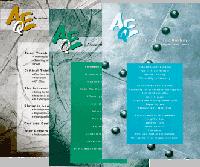Tinted Glasses: The Defining Power of Assessment

Academic Exchange Quarterly
The following article was published in the Academic Exchange Quarterly during my tenure with the journal as copy editor. Publication information is listed at the end of the essay.
My students hate grades. For most of their lives grades have defined them as types of students, good and bad. As college students they fear grades, convinced that poor grades will limit their chances for success while good grades will guarantee success. They are always alert to extra credit, some additional work they can do to elevate a flagging grade to passing status or a modest grade to more "respectable" status. For them, assessment is rarely about the quality of thinking or study or effort but a mark of rank and status.
For a state official or an administrator, the value of assessment may lie in identifying how to get "the most bang for the buck" when tax dollars are at a premium. Or high marks might be given to those institutions and programs which "economize and speed up production of college graduates" (Edward M. White, writing of a 1971 California State University administrative assessment plan) (White 308).
Assessment defines our values as much as it evaluates our activities. What we assess and how we assess it reveals what we consider important. In his article, "Engaging Intellectual Work: The Faculty's Role in Assessment," James F. Slevin argues that we must "make intellectual work . . . the primary focus of assessment and to make important intellectual values the governing principle of assessment" (Slevin 298)
Slevin warns of the danger of focusing on programs and institutions while neglecting the intellectual work of faculty and students. He takes issue with the statement made on the Association of American Colleges and Universities (AACU) web site <http://www.aacu_edu.org/Initiatives/priority1.html> which says "The curriculum as a whole and the institution as a whole are the most powerful teachers." Slevin counters--and I would agree--"Teachers, in classrooms, with their students, are the most powerful teachers" (Slevin 292). And, if teachers intend for their values to be at the center of assessment, they must be willing to participate in the sometimes political process of designing assessment mechanisms.
That such a process can become uncomfortable or even threatening can be seen in "The Opening of the Modern Era of Writing Assessment: A Narrative," Edward M. White's account of the efforts by members of the English departments of the California State University system to counter an administrative-engendered assessment program. His article reveals the need for faculty to become part of the process of defining assessment as well as the necessity for faculty to recognize the legitimacy of varying perspectives on assessment.
Although both of these articles focus on the importance of the first year writing program, the articles have a wider significance for all faculty engaged in developing assessment programs.
Bill Stifler
Copy Editor
Chattanooga State Community College
Academic Exchange Quarterly 5.1 (2001): 37.